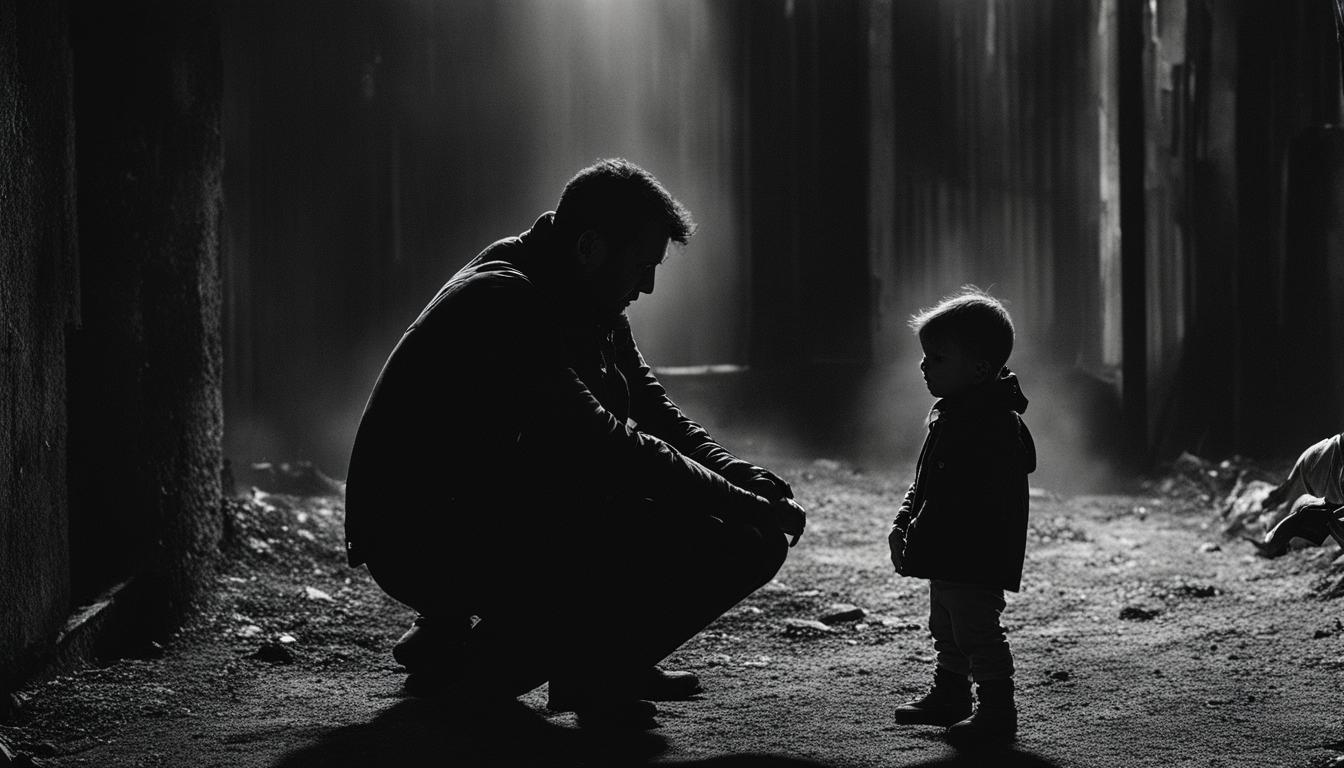Did you know that approximately 1.6% of American adults are believed to have Borderline Personality Disorder (BPD)? This common mental health condition not only affects those diagnosed with it, but also has significant effects on their families, especially when it comes to parenting.
Fathers with BPD exhibit unique characteristics and parenting traits that can be challenging to navigate. Understanding these traits and their effects on children is essential for maintaining a healthy family dynamic. In this article, we will explore the characteristics of a borderline father, the impact of a borderline father on children, and strategies for coping with and healing from these challenges.
Key Takeaways:
- Around 1.6% of adults in the United States are estimated to have Borderline Personality Disorder (BPD).
- Fathers with BPD exhibit unique parenting traits that can impact the family dynamic.
- Understanding the characteristics of a borderline father is crucial for navigating the challenges associated with this disorder.
- The impact of a borderline father on children can lead to emotional instability and difficulties in forming healthy relationships.
- Taking steps to establish boundaries, seek support, and prioritize self-care can help in coping with and healing from the effects of a borderline father.
The Impact of Pregnancy and Childbirth
During pregnancy and childbirth, the presence of a borderline father can have a profound effect on the family dynamic. This is particularly true for fathers who struggle with emotional instability. The transition into parenthood is a time of significant change and adjustment, and the emotional challenges faced by a borderline father can exacerbate the already stressful situation.
As the mother’s attention and energy are redirected towards the needs of the child, the borderline father may experience feelings of abandonment and sexual abandonment. This can lead to a deep sense of resentment and anger towards both the mother and the child. The father may feel neglected and overlooked, which can intensify his emotional instability and exacerbate his borderline traits.
The presence of a borderline father during pregnancy and childbirth can create a destabilizing environment within the family, impacting the child’s sense of security and well-being.
The borderline father may demand or encourage the mother to neglect the child in order to prioritize his own needs. This can create a destructive dynamic where the child’s well-being is compromised in order to appease the emotional instability of the father. It is crucial to recognize the negative impact this can have on the child’s development and emotional health.
The image above highlights the emotional turbulence experienced by a borderline father during pregnancy and childbirth. It illustrates the internal struggles and conflicts that can permeate the family, ultimately affecting the child’s sense of security and emotional well-being.
In summary, the emotional instability of a borderline father can create a highly volatile environment during pregnancy and childbirth. The father’s feelings of abandonment and sexual abandonment, coupled with his demand for attention and neglect of the child’s needs, can significantly impact the family dynamic. It is vital to address these challenges and prioritize the child’s emotional well-being in order to foster a healthy and secure environment.
Attachment Issues in Infancy
As the child grows older, they begin to form attachments with their parents that significantly influence their emotional well-being and development. However, when dealing with a borderline father, these attachment dynamics may be distorted, resulting in significant challenges for the child. Let’s explore the specific traits of a borderline dad and the impact it has on father-child dynamics.
Borderline Dad Traits:
- Seeking validation and attention from the child
- Using guilt and manipulation to control the child’s behavior
Borderline Father-Child Dynamics:
The attachment between a borderline father and their child is primarily centered around the father’s needs rather than the child’s. The father may crave validation and attention from the child, using manipulative tactics to gain control over their behaviors. This can create an unhealthy power dynamic and a sense of confusion and anxiety for the child. They may feel responsible for meeting the father’s emotional needs, further exacerbating their emotional distress.
In order to protect the child’s emotional well-being, it is crucial to recognize these attachment issues and establish firm boundaries within the father-child relationship. This can involve seeking professional support, such as therapy, to navigate the complex dynamics and develop coping strategies.
Expert Insight:
“Children of borderline fathers often experience confusion and anxiety due to the father’s manipulation and control attempts. It is important to provide them with a safe and nurturing environment while helping them understand that they are not responsible for meeting their father’s emotional needs.”
– Dr. Sarah Thompson, Child Psychologist

| Effects of Borderline Father on Child | Impact on Child’s Emotional Well-being |
|---|---|
| Confusion and anxiety | Diminished sense of self |
| Subordination of the child’s needs | Difficulty forming healthy relationships |
| Emotional distress and guilt | Low self-esteem |
Parenting Challenges and Inconsistent Boundaries
A father with borderline personality disorder (BPD) often faces unique challenges when it comes to parenting. Their inconsistent parenting style and difficulty in setting clear boundaries can have a profound impact on the child’s well-being and development.
One of the primary traits of a father with BPD is inconsistency in rules and expectations. The father may frequently change his mind or be unable to enforce consistent rules, leading to confusion and frustration for the child. This inconsistency can create an unstable and unpredictable environment, causing the child to feel anxious and unsure about how to behave or what to expect.
The father’s impulsive behavior and intense emotions further contribute to the challenges of parenting. Children of borderline fathers often find it difficult to predict how their father will react in different situations. This unpredictability can create a constant sense of vigilance and anxiety, as the child tries to navigate their father’s emotional landscape.
“The constant changes in our father’s rules and expectations made it hard for us to feel secure and know what was expected of us. We were always on edge, never knowing when a small mistake would set off an explosive reaction.”
Establishing clear boundaries becomes crucial for both the child and other family members to manage the challenges of parenting with a borderline father. Setting consistent rules and expectations can provide stability and structure for the child, helping them feel more secure and confident in their environment.
Effective communication is also essential in navigating parenting challenges with a borderline father. Openly expressing needs, concerns, and emotions can help bridge the gap between family members and foster understanding. It is important to encourage the father to seek therapy and support to address his BPD symptoms and develop healthy coping strategies.
By establishing clear boundaries and encouraging open communication, families can work together to navigate the unique challenges posed by a borderline father. With patience, understanding, and support, it is possible to create a nurturing and healthy environment for the child to thrive.

| Challenges | Impact on Child |
|---|---|
| Inconsistent rules and expectations | Confusion and frustration |
| Impulsive behavior and intense emotions | Anxiety and unpredictability |
| Lack of clear boundaries | Difficulty in understanding expectations and behavior |
| Communication difficulties | Isolation and emotional turmoil |
Emotional Manipulation and Control Tactics
Borderline fathers often resort to manipulation tactics to exert control over their partners and children. These tactics can create a toxic and abusive environment within the family, where emotions and actions are manipulated to serve the father’s needs. It is essential to be able to identify these manipulative behaviors and seek support to break free from their grasp.
Identifying a Borderline Father
Recognizing a borderline father can be challenging, as their manipulation tactics are often subtle and disguised as concern or love. However, an understanding of common manipulative behaviors can help identify a borderline father:
- Guilt tripping: Borderline fathers frequently use guilt as a way to control others. They may make their partners or children feel responsible for their emotional state or use guilt to pressure them into complying with their desires.
- Threats: Manipulation through threats is another common tactic employed by borderline fathers. They may use threats of abandonment, harm, or other consequences to control their partners or children.
- Emotional blackmail: Borderline fathers often manipulate by leveraging emotions to gain power. They may threaten to withdraw love or affection unless their demands are met, leaving their partners or children feeling trapped and manipulated.
“Emotional manipulation can manifest in various ways, making it crucial to stay vigilant and recognize the signs of a borderline father.” – Expert Counselor.
To effectively navigate the challenges posed by a borderline father, it is crucial to identify these manipulative tactics and seek support from professionals experienced in dealing with personality disorders.

| Signs of Manipulation Tactics | Impact on Family Members |
|---|---|
| Constant feeling of guilt | Emotional and mental distress |
| Feeling trapped and controlled | Loss of self-esteem and confidence |
| Experience of fear and anxiety | Difficulty in establishing healthy relationships |
Impact on Children’s Sense of Self
Growing up with a borderline father can have a profound impact on a child’s sense of self. The effects of a borderline father on the family can be far-reaching and can shape a child’s perception of themselves and their interactions with others.
Inconsistent parenting and emotional instability can lead to low self-esteem and a lack of confidence in children. The unpredictable nature of a borderline father’s behavior can create a sense of anxiety and unease, making it difficult for children to feel secure in themselves and their abilities. The constant manipulation and emotional turmoil can leave children feeling confused, inadequate, and unworthy of love and affection.
Children of borderline fathers may also internalize the abusive behaviors and blame themselves for their father’s actions. They may believe that they are the cause of their father’s anger or resentment, leading to feelings of guilt and shame. This distorted self-perception can persist into adulthood, affecting their relationships and overall well-being.
It is crucial for children to seek support in coping with a borderline father’s impact on their sense of self. Professional therapy can provide a safe space for children to explore their emotions, challenge negative beliefs, and develop healthy coping strategies. It is important for children to understand that they are not responsible for their father’s actions and that their worth as individuals is not determined by their father’s behavior.

| Effects of a Borderline Father on Children’s Sense of Self | Examples |
|---|---|
| Low self-esteem | Feeling inadequate and unworthy |
| Lack of confidence | Doubting their abilities and potential |
| Anxiety | Constantly worried about their father’s reactions |
| Guilt and shame | Blaming themselves for their father’s behavior |
| Distorted self-perception | Believing they are responsible for the father’s actions |
The Role of Therapy and Healing
Parenting with borderline personality disorder can present unique challenges, but therapy can play a crucial role in healing and navigating these difficulties. Whether you are a father with BPD or a child of a borderline father, seeking therapy can provide valuable support and guidance in understanding and managing the impact of this disorder on your family dynamics.
Individual therapy is beneficial for both the father and the children. It allows each person to address and explore their underlying emotional issues, develop healthy coping strategies, and work towards personal growth. Through individual therapy, fathers with borderline personality disorder can gain insight into their behavior and emotions, learn effective communication skills, and develop healthier parenting strategies.
Additionally, family therapy can be instrumental in fostering open communication, resolving conflicts, and establishing clear boundaries within the family. It provides a safe space for all family members to express their thoughts and feelings, facilitating understanding and healing. Family therapy sessions can also focus on improving parent-child relationships, cultivating healthy attachment, and implementing consistent parenting practices.
It’s important to understand that recovery is possible for both the father and the children. With the right support and therapeutic interventions, individuals with borderline personality disorder can experience growth, develop healthier coping mechanisms, and establish more positive and fulfilling relationships with their children. Therapy offers a pathway to healing and creating a healthier family environment.
“Therapy offers a pathway to healing and creating a healthier family environment.”
To better comprehend the impact of a borderline father and to ensure a healthier family dynamic, therapy is a valuable resource worth considering. It provides a supportive and professional space where both the father and the children can navigate the challenges of parenting with borderline personality disorder and find healing and growth.

Seeking Support and Establishing Boundaries
Recognizing the signs of a borderline father is the first step in navigating the challenges associated with his personality disorder. Understanding the impact of a borderline father on the family is crucial for establishing a healthier family dynamic. It is essential for family members to prioritize their own well-being and seek support to cope with the effects of a borderline father.
Signs of a Borderline Father
Identifying the signs of a borderline father can help family members recognize and address the issues that may arise. Some common signs include:
- Intense mood swings and emotional instability
- Impulsive and unpredictable behavior
- Difficulty maintaining consistent boundaries and rules
- Manipulative tactics to control others
- Lack of empathy and understanding

It is important to remember that not all fathers with borderline personality disorder will exhibit all of these signs, and each individual’s experience may vary.
Establishing Clear Boundaries
Establishing clear boundaries is key to managing the impact of a borderline father on the family. Setting boundaries helps define expectations and create a sense of safety within the family dynamic. Here are some tips for establishing and maintaining boundaries:
- Communicate openly and honestly about your needs and boundaries.
- Be assertive in expressing your feelings and setting limits.
- Establish consequences for crossing boundaries and follow through with them.
- Seek professional guidance, such as therapy or counseling, to learn effective boundary-setting strategies.
Seeking Professional Support
Dealing with the impact of a borderline father can be emotionally challenging. It is important to seek professional support and guidance to navigate these difficulties. Therapists, support groups, and other resources can provide valuable insights and coping strategies. Professional support can help individuals and families develop healthier ways of managing the effects of a borderline father and promote healing and growth.
Remember, seeking support is not a sign of weakness but a proactive step towards creating a healthier and happier family environment.
Conclusion
Navigating the traits of a borderline father can be challenging, but it is important to recognize that healing and growth are possible. Parenting with a borderline father can have significant effects on the family dynamic, but by understanding the characteristics of a borderline father and implementing strategies to cope with them, individuals and families can create a healthier and happier environment.
Establishing consistent boundaries is essential when parenting with a borderline father. Clearly defining expectations and limits can provide stability and structure for both the children and the father. Communicate openly and assertively with the father, emphasizing the importance of respecting boundaries and creating a safe space for everyone involved.
Seeking therapy is crucial for individuals and families coping with the effects of a borderline father. Therapy offers a supportive and professional environment to address emotional issues, develop coping strategies, and foster healthy relationships. Individual therapy can help the father address his borderline personality disorder, while family therapy can assist in improving communication, resolving conflicts, and establishing healthy dynamics.
Remember, you are not alone. Support is available for those parenting with a borderline father. Reach out to therapists, support groups, and online communities that specialize in borderline personality disorder and parenting with challenging family dynamics. By prioritizing self-care and seeking support, we can overcome the challenges posed by a borderline father and create a nurturing and fulfilling family environment.
FAQ
What are the characteristics of a borderline father?
A borderline father may exhibit traits such as emotional instability, impulsive behavior, unstable relationships, self-image disturbances, intense emotions, and an inconsistent parenting style.
How does a borderline father impact children?
Growing up with a borderline father can result in low self-esteem, difficulties forming healthy relationships, and a lack of confidence. Children may also internalize the abusive behaviors of their father and blame themselves for his actions.
What are the effects of a borderline father on the family?
The presence of a borderline father can create instability, emotional turmoil, and a toxic and abusive environment within the family. It can also impact the mother’s relationship with the child and create a sense of competition for her attention.
How can I navigate the traits of a borderline father?
It is important to establish clear boundaries, communicate your needs, and seek support from therapists, support groups, and other resources to cope with the impact of a borderline father. Prioritizing self-care is also essential.
What are some signs of a borderline father?
Signs of a borderline father may include emotional instability, impulsive behavior, intense reactions, inconsistent parenting styles, manipulation tactics, and a lack of clear boundaries.
How can therapy help in parenting with a borderline father?
Individual therapy for both the father and the children can address underlying emotional issues and develop healthy coping strategies. Family therapy can foster open communication, address conflicts, and establish clear boundaries.
What is the impact of a borderline father on children’s sense of self?
A borderline father’s inconsistent parenting, emotional instability, and manipulation can lead to low self-esteem, a lack of confidence, and difficulties in forming healthy relationships. Children may internalize their father’s abusive behaviors and blame themselves.
How can I cope with a borderline father?
Coping with a borderline father involves seeking support, establishing boundaries, prioritizing self-care, and learning healthy coping strategies. It is important to remember that healing and growth are possible.
What should I do if I suspect that my partner or spouse is a borderline father?
If you suspect that your partner or spouse is a borderline father, it is important to seek professional help, educate yourself about borderline personality disorder, and reach out to support groups and resources for guidance.









